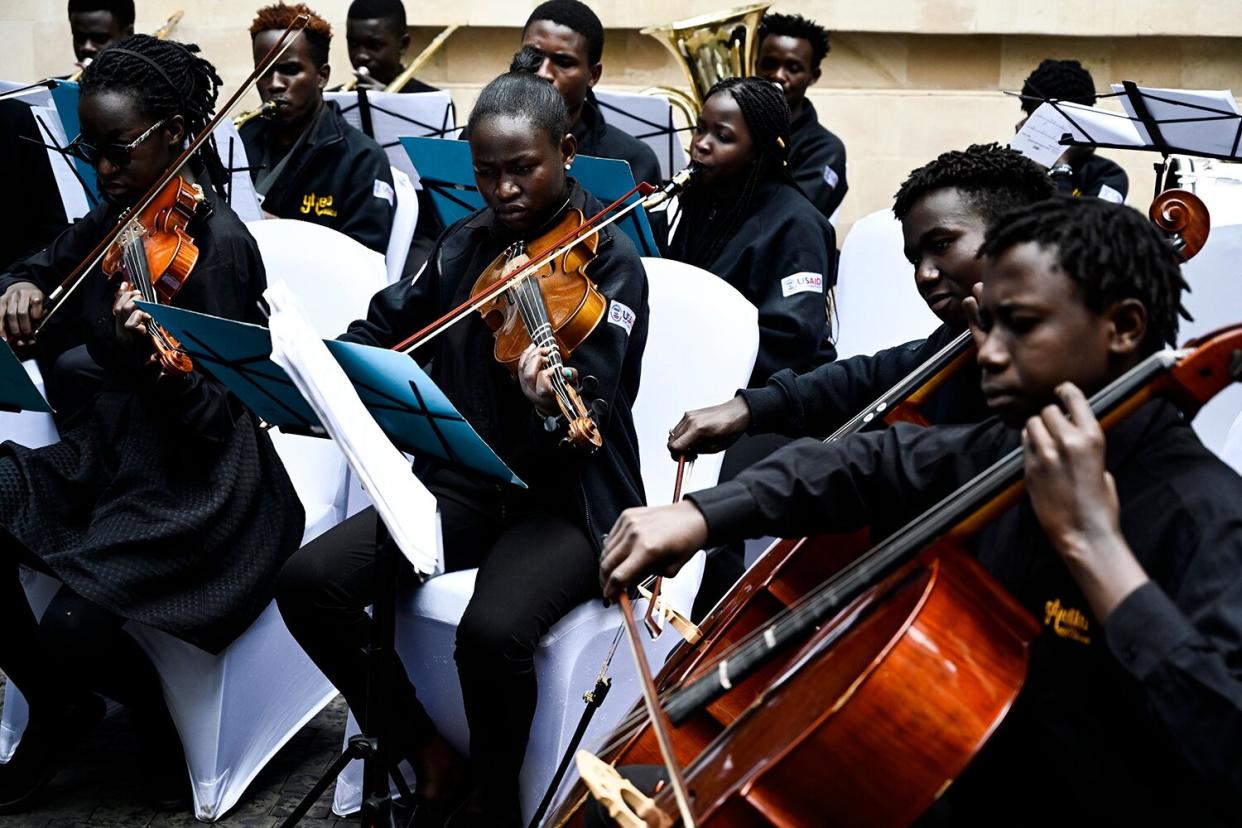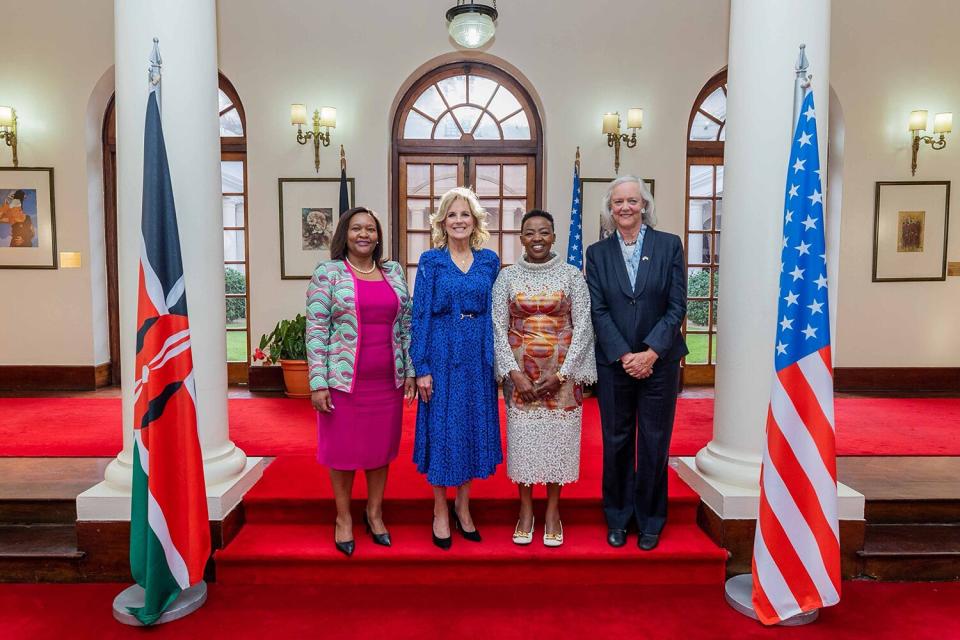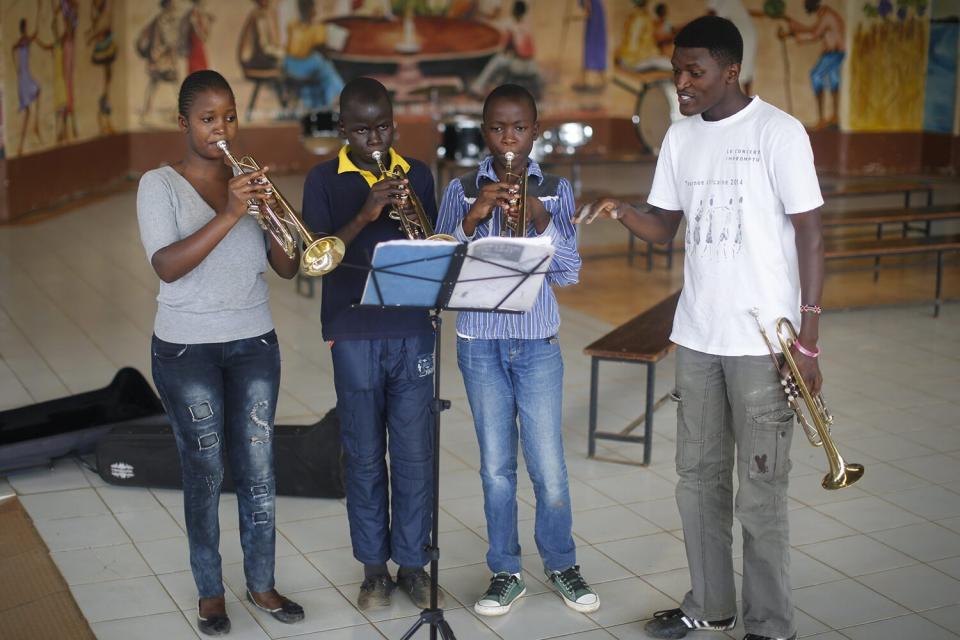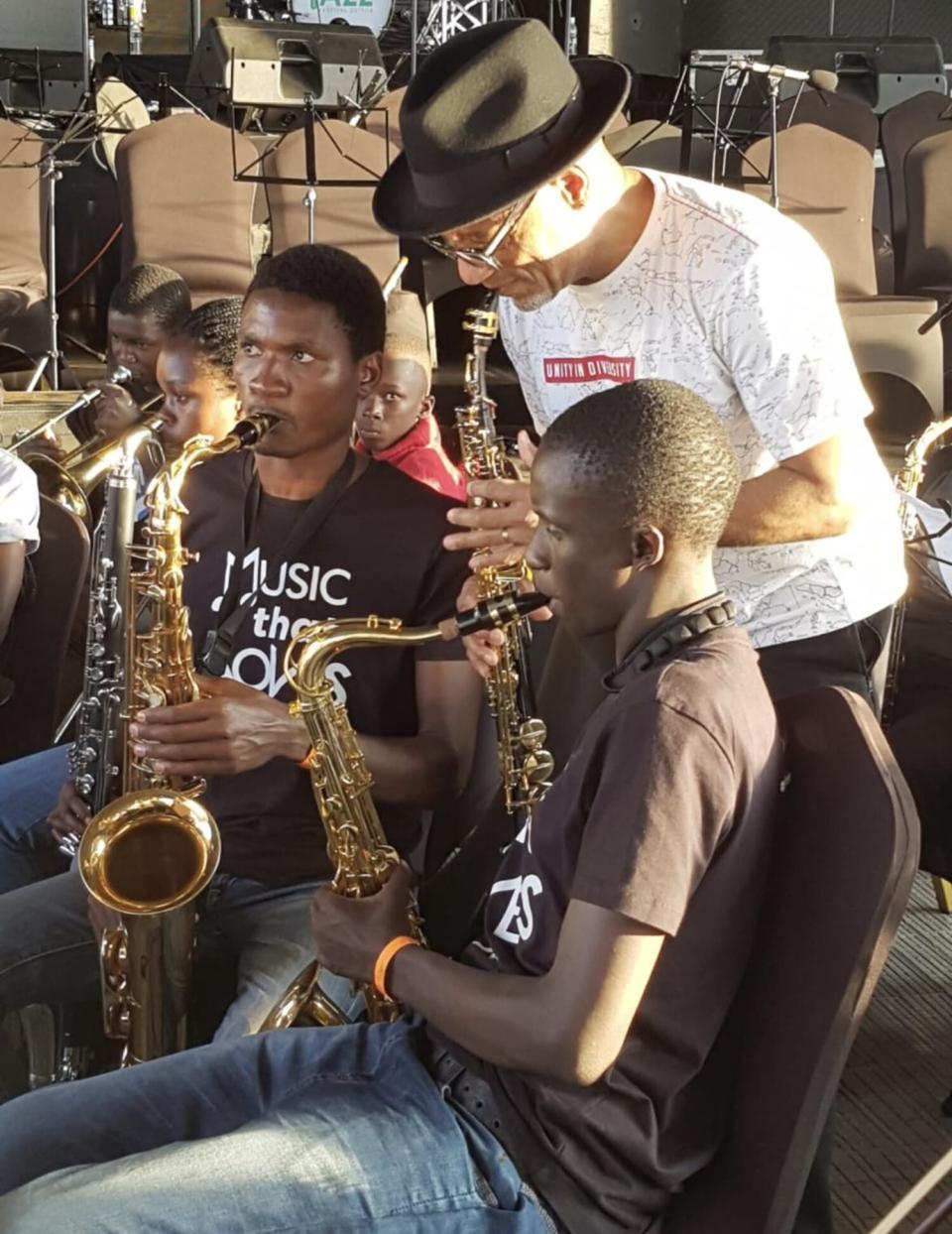The Remarkable Story of the Orchestra Born from a Nairobi Garbage Dump

SIMON MAINA/AFP via Getty Images Members of Ghetto Classics
When Dr. Jill Biden was traveling in Africa last week, she not only helped cement relations between the United States and Kenya — she also helped add another string to the bow of a unique musical group.
Ghetto Classics — the orchestra that entertained the first lady at the residence of the U.S. ambassador to Kenya — grew out of one of the most deprived slums of the capital Nairobi, right alongside an enormous garbage dump. Leading a round of applause after their performance, the first lady said, "They were great," before adding at the gathering, "It was so wonderful to be greeted by the talented musicians."
Playing for Dr. Biden was the latest milestone for the group, which turns 15 in May, as they have also played for President Barack Obama, Pope Francis and notable visiting musicians like saxophonists Branford Masalis and Kirk Whalum — the latter of whom toured with Whitney Houston and soloed on "I Will Always Love You."

Photo by Office of the First Lady of Kenya / Handout/Anadolu Agency via Getty Images U.S First Lady Jill Biden in Nairobi
Ghetto Classics had the most humble of origins, launched in Nairobi's Korogocho neighborhood, on the edge of Kenya's largest rubbish dump. The waste provides a living of sorts for those who live on its border, as families scavenge and trade in what others throw away.
But it is also seemingly an incongruous place for such beautiful art, says journalist Ginanne Brownell, who has written a new book on the group. "The first time I visited, I was standing there and all these fumes were just so toxic. And yet I'm hearing Vivaldi," she says. "And I was thinking this is such a juxtaposition."
Her book Ghetto Classics: How a Youth Orchestra Changed a Nairobi Slum charts how the group was created after Elizabeth Njoroge — a pharmacist who returned to her native Kenya after training and working in Canada and Britain — paired up with a priest from the local St. John's parish who wanted to build on the local choir.

Dai Kurokawa/EPA/Shutterstock
Njoroge started with clapping and explaining some musical theory and, after holding a small concert about a year into the project, branched out into securing instruments from wherever she could, networking with local diplomats and others who could provide some support.
"Over time, they just got more clout within the music community because they had lots of people involved in the Kenyan music world like conductors and others who were helping with the music education," adds Brownell.
Saxophonist Branford Marsalis donated some reeds for wind instruments, and others like David Sanborn and Kirk Whalum also joined them for a session. Top musical tutors from far afield have mentored them and conducted lessons over video calls.

Courtesy Ginanne Brownell Scavenging in the dump
When Brownell first visited the landfill, "it just made your stomach turnover," she says. "It was pretty harrowing." Perhaps no more so than when she spotted a sign up from an organization helping young mothers, imploring them not to leave their babies in the dump. "It was really graphic. That shows you the dire situation. And yet there's so much energy and inspiration and even lots of laughter."
"For a kid who's growing up in a really terrible environment where his mom's an alcoholic and his dad's not around and his sister's died of AIDS, there's something where he can learn how to play piano and music can be sort of quite therapeutic too," Brownell says. "It's giving them an outlet — something that they can focus on."
One of the young people she features, Simon Karuki Ndungu, could have followed in the direction that saw his father be an alcoholic and his brothers in gangs, but has gone on to be involved in the running of the orchestra. "He realized that music was a way kind of out of the world that he lived in, but he also kind of became this social activist within his community for the orchestra," she adds.

Courtesy of Ginanne Brownell Ghetto Classics rehearse
Another young man, who lost six of his siblings to murder or early death, tells Brownell how the music helps take away the stress in his head. She says, "He realized that if he really made that his focal point versus instead going out and scrounging in the garbage dump or selling drugs, that was kind of the way forward."
Like many, he has been able to get an education from all over – via Zoom, in person and through an apprenticeship to become the orchestra's luthier in Hamburg. "What's interesting is a lot of these people that I write about in the book have pretty much, you know, either stayed within the Ghetto Classics world if they were hired eventually as tutors, or they got other jobs through their experiences with the orchestra," Brownell says.
They have also become beacons in the local community, reaching out to create a vegetable garden for locals during COVID, for example. Brownell adds that not only has it taught them things like responsibility, timekeeping and of course the skill of learning how to read music," Brownell says. "But I think it's also taught a lot of them, you know, how to feel empowered to change and shape their community."

Courtesy Elizabeth Njoroge
And they've enthralled those professional musicians who they've been introduced to and mentored by. One of those esteemed musicians, Whalum, tells PEOPLE, "Going to Korogocho and meeting the angels of Ghetto Classics has rendered me forever changed. Not only have I adopted them in my heart, but selfishly speaking, they have given a sort of context to my life and career for which I am grateful."
Never miss a story — sign up for PEOPLE's free daily newsletter to stay up-to-date on the best of what PEOPLE has to offer, from juicy celebrity news to compelling human interest stories.
He explains his first trip out to meet the Ghetto Classics: "I will never forget how the roads seemed to disintegrate into chaos right before our eyes — and under our tires — leading from Nairobi to Korogocho. Then when we made it to Korogocho proper the car fell silent," he says. "None of us were prepared for what we would see. The abject squalor was more than we could take in at once."
Whalum notes that it's that exact squalor that makes Ghetto Classics such an unexpected treat to witness.
"It was as if we were being set up for the incredible transformation that these wonderful children would cause us to experience once we heard them play," he says. "Their sweet, innocent, respectful and passionate demeanor washed over us and we immediately felt purified in a way. The harshness and difficulty of their daily lives was all but invisible as their bright eyes and beautiful smiles cleansed the dust of privilege and ignorance from our hearts."


